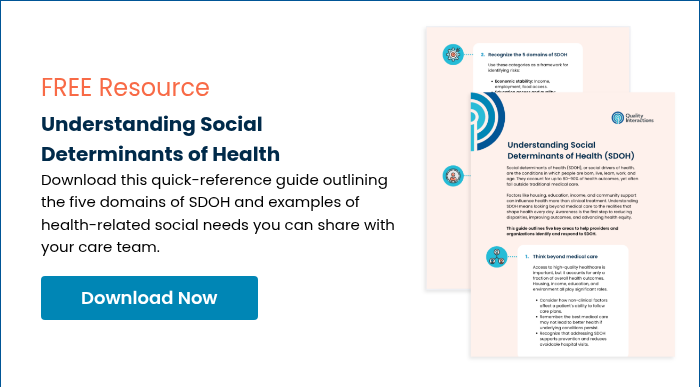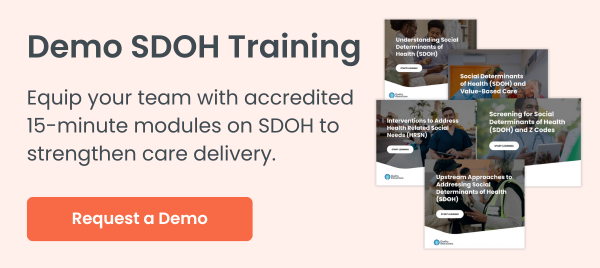
Health is shaped by much more than clinical care. Research shows that up to 80% of health outcomes are influenced by social, economic, and environmental factors such as housing stability, food security, education, and neighborhood safety. These social determinants of health (SDOH) have a profound effect on patients’ ability to access and benefit from healthcare.
When clinicians and care teams understand how these factors impact their patients, they can better identify barriers to care, connect individuals to resources, and design interventions that promote long-term health and well-being.
The growing need for SDOH literacy in healthcare
Healthcare organizations across the country are increasingly being held accountable for addressing SDOH, not only by accreditation bodies and payers but also by patients themselves. Value-based care models, NCQA’s health equity standards, and The Joint Commission’s requirements all emphasize the importance of identifying and addressing patients’ social needs.
But many healthcare workers feel underprepared to talk with patients about social and environmental factors that affect their health or to integrate SDOH into their daily workflows. That’s where training becomes essential. Building SDOH literacy across care teams helps transform awareness into action and equips professionals to provide person-centered care.
Key elements of effective SDOH training
A well-designed SDOH training program should do more than define terms, it should build practical skills that translate into better care. Effective training includes:
-
Foundational knowledge: Clear explanations of the five SDOH domains—economic stability, education, social context, healthcare access, and neighborhood environment—and how they intersect with health disparities.
-
Communication and trust-building: Techniques such as active listening and empathy-based questioning help clinicians uncover patients’ underlying social needs without making them feel judged or stigmatized.
-
Screening and documentation skills: Guidance on integrating SDOH screening tools into electronic health record (EHR) workflows and documenting findings in ways that support care coordination and population health management.
-
Resource navigation: Training on connecting patients to social service agencies, community programs, and benefit resources, ideally through established referral pathways or care coordinators.
-
Organizational context: Discussion of how SDOH initiatives align with quality improvement goals, equity strategies, and value-based care metrics.
How Quality Interactions helps
Quality Interactions’ Social Determinants of Health training includes five accredited modules, each designed for busy healthcare professionals. Every module takes 15 minutes or less to complete, making it ideal for on-the-go learning that fits seamlessly into clinical schedules.
The series covers everything from understanding SDOH and health-related social needs (HRSN) to applying appropriate Z codes for documentation and billing, helping clinicians translate knowledge into measurable action.
These concise, expert-developed modules give organizations an efficient way to upskill their care teams, meet compliance standards, and improve patient outcomes through a stronger understanding of the social factors that shape health.
Empowering care teams to drive change
When healthcare workers have the knowledge and confidence to address SDOH, they become powerful advocates for health equity. Whether identifying a patient’s transportation challenge, connecting a family to nutrition support, or advocating for systemic changes, trained care teams can help close the gap between clinical care and the conditions that shape health.
Training the healthcare workforce to address social determinants of health isn’t just about compliance, it’s about impact. Equipping teams to see patients in the context of their lives creates better experiences, stronger communities, and healthier outcomes for all.
Request a demo of Quality Interactions' Social Determinants of Health training to bring high-quality SDOH training to your team today.
You may also like:
- Understanding Social Determinants of Health: Five Key Areas for Providers
- Active Listening in Clinical Conversations [Tip Sheet]
- Addressing Health Literacy in Everyday Practice [Free Checklist]
- What Physicians Need to Know About Person-Centered Care


